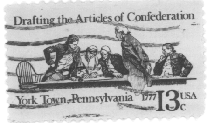New concept of government needed
Unfortunately, however, in the solution of other problems the Articles of Confederation proved disappointing. Their notable shortcoming was their failure to provide a real national government for the thirteen states which had been tending strongly towards unification since their delegates first met in 1774 to protect their liberties against encroaching British power. Pressures arising from the struggle with England had done much to change their attitude of twenty years before when colonial assemblies had rejected the Albany Plan of Union. Then they had refused to surrender even the smallest part of their autonomy to any other body, even one they themselves had elected. But, in the course of the Revolution, mutual aid proved efficacious, and the fear of relinquishing individual authority in some spheres had, to a large degree, lessened.
 The Articles went into effect in 1781. Though they constituted an advance over the loose
arrangement provided by the Continental Congress system, the governmental framework they
established had many weaknesses. There was quarreling over boundary lines. The courts handed
down decisions which conflicted with one another. The legislatures of Massachusetts, New
York, and Pennsylvania passed tariff laws which injured their smaller neighbors. Restrictions
upon commerce between states created bitter feeling. New Jersey men, for example, could not
cross the Hudson River to sell vegetables in New York markets without paying heavy entrance
and clearance fees.
The Articles went into effect in 1781. Though they constituted an advance over the loose
arrangement provided by the Continental Congress system, the governmental framework they
established had many weaknesses. There was quarreling over boundary lines. The courts handed
down decisions which conflicted with one another. The legislatures of Massachusetts, New
York, and Pennsylvania passed tariff laws which injured their smaller neighbors. Restrictions
upon commerce between states created bitter feeling. New Jersey men, for example, could not
cross the Hudson River to sell vegetables in New York markets without paying heavy entrance
and clearance fees.
The national government should have the power to lay whatever tariffs were necessary and to regulate commerce- but it did not. It should have had the authority to levy taxes for national purposes-but again it did not. It should have had sole control of international relations, but a number of states had begun their own negotiations with foreign nations. Nine states had organized their own armies, and several had little navies of their own. There was a curious hodgepodge of coins minted by a dozen foreign nations and a bewildering variety of state and national paper bills, all fast depreciating in value.
Economic difficulties subsequent to the war also caused discontent, especially among the farmers. Farm produce tended to be a glut on the market, and general unrest centered chiefly among farmer-debtors who wanted strong remedies to insure against the foreclosure of mortgages on their property and to avoid imprisonment for debt. Courts were clogged with suits for debt. All through the summer of 1786, popular conventions and informal gatherings in several states demanded reform in the state administrations. Many yeomen, facing debtor's prison and loss of ancestral farms, resorted to violence.
In one state-Massachusetts-mobs of farmers, under the leadership of a former army captain, Daniel Shays, in the autumn of 1786, began forcibly to prevent the county courts from sitting and to prevent further judgments for debt, pending the next state election. They met with stout resistance from the state government, and for a few days there was danger that the state house in Boston would be besieged by an infuriated yeomanry. But the rebels, armed chiefly with staves and pitchforks, were repulsed by the militia and scattered into the hills. Only after the uprising was crushed did the legislature consider the justice of the grievances which had caused it and take steps to remedy them.
